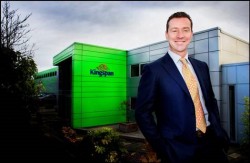Kingspan's Irish timber-frame construction arm has capacity to produce 4,500 Irish houses a year, and offsite prefabrication is recovering faster than traditional building, CEO Gene Murtagh said.
He was speaking after results yesterday when the construction supplies group warned that it expects a sharp slowdown in demand in Britain for its insulated panels to carry on because of what it termed the "Brexit quagmire".
Shares fell on that news, closing down more than 4pc at €35.70 each yesterday.
Reporting its full-year results, Kingspan said that while the UK market proved resilient for much of the year, the low rise, non-residential sector had experienced a marked reduction in the last three months of 2017, hitting demand for Kingspan insulation products.
"Investors are holding back," Gene Murtagh said.
"I think what we're seeing is a little bit of investor pullback when it comes to construction," he added.
"It's quite logical that investors would hang back given the present uncertainty to see which direction things are going." He said the UK accounts for 25pc of Kingspan's sales compared to 75pc a decade ago, thanks to growth elsewhere.
However, the UK business does tend to be higher margin, he said.
In Ireland, construction is "relatively healthy" he said but still substantially below the boom levels of output.
In the UK big housebuilders, including Berkeley, are increasingly looking to factory-manufacture houses for fast, final assembly on site.
The sector here is too small scale for individual construction builders to establish factories for prefabrication - but partnerships to shift from traditional construction are possible, Mr Murtagh told the Irish Independent.
Kingspan paid €98m for timber frame manufacturer Century Homes in 2005, but that business has suffered as a result of the decade-long housing slump.
However, Mr Murtagh said yesterday that at its peak Century supplied 4,500 housing units a year, and that the capacity still exists to do that. "Timber frame had a very strong recovery last year," the Kingspan CEO said. Timber frame now accounts for a greater share of new build than during the boom, he added.
In terms of boosting housing output quickly, and cutting costs, the more that is built in factories "the better", he said.
Ireland is now a relatively small market for Kingspan. It generates a quarter of its sales in the UK, but has expended into continental Europe.
Last year it entered the South American market through €600m of acquisition.
New businesses helped lift Kingspan's profits by 11pc year-on-year to €377.5m in 2017.
Overall revenues jumped 18pc to €3.7bn. Acquisitions contributed 9pc of turnover and 8pc of profits in 2017.
Kingspan's insulated panels business recorded sales growth of 17pc, driven by a 'positive' performance in continental Europe and a 'solid outcome' in North America, which compensated for the sharp slowdown in the UK towards year end.
The group's insulation board recorded sales growth of 12pc, owing to what the group said was significant price inflation and the structural shift to Kooltherm in the UK, Ireland and mainland Europe.
Earning at the group before interest, taxation, depreciation, and amortisation were €442m, a 9pc increase year-on-year. (Additional reporting Reuters)
Image: Overall revenues jumped 18pc to €3.7bn at Kingspan, led by CEO Gene Murtagh
Original link - Independent









